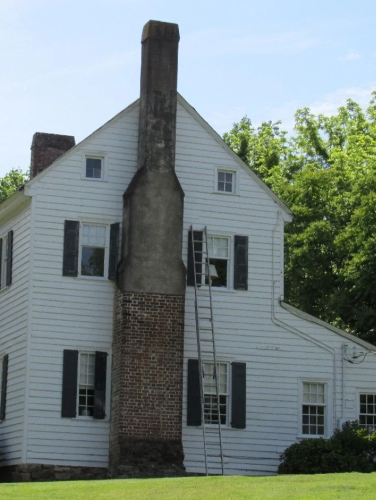
Neel House
(ca. 1810-1828)
The Federalist style Neel House was the longtime home of one of Steele Creek’s most prominent families.
5517 Samuel Neel Road, Charlotte, NC 28278
There is insufficient documentation to pinpoint the exact date of construction of the Neel House, but it was likely built sometime between 1810 and the 1828 death of its original inhabitant, Samuel R. Neel (1773-1828). The son of Revolutionary War veteran Captain Henry Neel and Nancy Reed Neel, Samuel was born into a family of considerable wealth. Henry Neel was among the early Scotch-Irish settlers in the Steele Creek section of what was then Anson County. Henry Neel began acquiring land along the banks of Armour's Creek as early as 1762.
Property Quick Links
Samuel acquired a significant portion of that property upon his father’s death, becoming a prominent farmer and landowner within the Steele Creek community. He married Margaret Grier (1781-1837) in 1798, and eight children were born to this union. Samuel built the extant Federalist style Neel House to replace a less refined residence in which his growing family dwelled nearby. Margaret continued to live in the house as a widow until her death in 1837. The Neel family farm continued to prosper under the supervision of her four surviving sons, the youngest of whom, Alexander Grier Neel (1815-1898), resided in the Neel House until his death. For many years, Alexander served as an elder in the Steele Creek Presbyterian Church, carrying on the Neel family tradition of active membership in that congregation. Following his death, Alexander’s widow and children sold the Neel House and surrounding property in 1899.
The most prominent of Samuel’s children was his eldest son General William Henry Neel (1799-1888). He acquired the title of “General” from his many years of leadership of the local militia but was too old for military service when the Civil War broke out. Still, William long maintained a keen interest in public affairs and served for a time as county commissioner. Married in 1819 to Hannah G. Alexander, the couple lived in a home that he constructed near the Neel House. William derived his livelihood from the cultivation and processing of cotton, being one of Mecklenburg County’s first citizens to engage in the cotton manufacturing business. He operated the county’s first cotton mill prior to the Civil War in a converted grist mill located near his home. Like others in his family, William was a longtime member of Steele Creek Presbyterian Church. His obituary described him as “the embodiment of progress, enterprise, and liberality in Mecklenburg County.”

